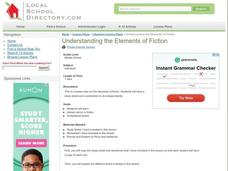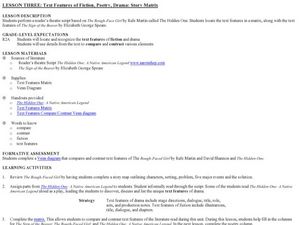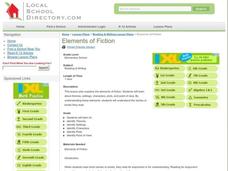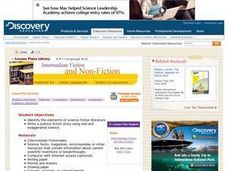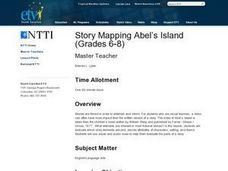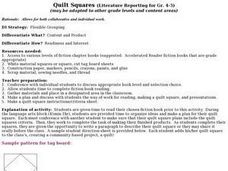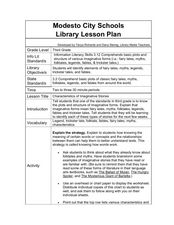Curated OER
Parts of a Story
In this story worksheet, students read about different story elements such as setting, characters, plot, and theme. Each element is illustrator by a cartoon.
Curated OER
The News Behind the Story
What a fun way to analyze plot, setting, and character. Learners review story elements, read a short fictional story, then turn the events of that story into a headlining news paper article. Not only does this lesson engage critical...
Curated OER
Introduction to Main Events
Identify main events in a text. Readers will read The Kissing Hand and discuss the main events of the story. They will use sentences strips to write down events and place them in order. Alternative books are suggested.
Curated OER
Understanding the Elements of Fiction
Inform your class on the elements of fiction: themes, settings, characters, plots, dialogue, narration, flashback, clues, climax, resolution. They write the definitions of the terms on the worksheet provided.l Tip: Have them write a...
Curated OER
Brown Bagging with Short Stories
Students participate in a study of short story elements, applying their knowledge and understanding to a selection of short stories. In this short stories lesson, students read five short story selections, identifying conflict,...
Curated OER
Lesson Plan 7: The Elements of Story
Budding novelists work on character development by relating to the characters in their stories. They imagine their own hopes and dreams and recall those of characters from books they've read. Learners also consider struggles the...
Curated OER
Daughters Come of Age in Women's Fiction
Introduce your young readers to fiction written by women authors. For each story, they explore the way these daughters discover and claim their own identities. Individually, class members use the literature to examine their role in their...
Curated OER
Come Fly with Me . . . Open a Book: Travels through Literature
This detailed overview of a curriculum unit suggests using travel literature to engage and stimulate your third graders’ interest in reading. The suggested reading list includes fiction and non-fiction materials and offers urban children...
Curated OER
Analyzing the Use of Irony in a Short Story
Ninth graders examine how literature connects to real-life and see how irony aids in the development of theme. They read Shirley Jackson's The Lottery, and discuss elements of foreshadowing and situational irony. Then learners will write...
Curated OER
Text Features of Fiction, Poetry, Drama: Story Matrix
How do novels differ from plays? Explore with your class the text features of fiction and drama by reading The Hidden One: Native American Legend and then performing a reader’s theater script based on the story. Class members create a...
Warren County Public Schools
Small Group Discussion Questions
Support a class reading of the novel Song of the Trees by Mildred D. Taylor with this series of discussion questions. Covering a variety of topics from character and setting to historical accuracy and symbolism, these questions...
Syracuse City School District
Literary Elements
Address the literary elements in a piece of writing using these materials. The packet includes plenty of resources, and focuses mainly on theme, character, and point of view, with some materials for setting, symbolism, and author's...
Curated OER
Elements of Fiction
Students identify key story elements in a fiction text. In this literacy lesson, students are introduced to the various elements of fiction such as the setting, plot, and theme. Students read a short story of their choice and identify...
Curated OER
Science Fiction Literature
Learners identify the elements of science fiction literature. They write and illustrate a science fiction story using real and exaggerated science. In addition, they read their stories aloud in small groups.
Curated OER
Story Mapping Abel's Island
Young scholars are able to prioritize story elements using graphic organizers. They are able to evaluate character, setting and sequence in a non-print source. Students use visual and audio clues to help them evaluate the parts of a...
Curated OER
Five Elements of a Story
Here’s a graphic organizer that permits learners to chart the introduction, rising action, climax, falling action and resolution of a story. The PDF file can be customized to work with any narrataive.
Curated OER
Writing a Historical Fiction Story
Students create a historical fiction story. In this historical fiction lesson, students choose a time period to use as their setting. They create a story with true elements but fictional characters and plot.
Curated OER
Quilt Squares-Literature Reporting
Differentiate instruction with this crafty approach to demonstrating comprehension. Learners choose a fictional book at their reading level, and afterward create a quilt square. The square is "decorated" with words, illustrations, and...
Pennsylvania Department of Education
Exploring Key Ideas and Details in Fiction and Nonfiction
Third graders participate in activities to differentiate fiction from nonfiction. In this fiction instructional activity, 3rd graders describe the elements of a fiction story. Students compare and contrast fiction and non...
Curated OER
Comparing Fiction and Nonfiction
Fifth graders compare and contrast an informational article with a fictional story. They read the story "The Contest" as a class, and discuss the different types of literature genres. Next, they complete a vocabulary worksheet and a...
Curated OER
Characteristics of Imaginative Stories
Third graders explore genre characteristics. In this genre literacy lesson, 3rd graders listen to a variety of fiction stories and classify them according to genre. Students identify common features in each genre and complete a chart by...
Curated OER
The Memory Invention
Young writers edit their writing to make sure it shows good meaning and clarity. In this writing lesson, learners are given a variety of "What If?" scenarios to choose from as writing prompts. A class discussion ensues, which focuses on...
Curated OER
Snapshots of a Short Story
First graders will be creating and filling in a graphic organizer using Kidspiration, as a pre-writing activity for their short story piece. They then use their graphic organizers to write their entire short story. Once written, the...
Curated OER
Different Strokes For Different Folktales
Young readers use graphic organizers, such as Venn diagrams and story maps, to analyze a variety of folktales and the elements of a story. They use writing, sequencing activities, and creative art to identify the morals learned from a...





